Restaurants
Amar is now open at the elegant new Back Bay hotel.

“History inspires me to create,” shares chef George Mendes, who starts our conversation on the 17th floor of Raffles Boston, which is now open.
The long-awaited reveal of Raffles Boston, which celebrates the Singapore-originated brand’s first property in North America, brings with it five gastronomic concepts, including a speakeasy, a European-styled cafe, an all-day eatery, and two fine-dining establishments.
As one of the elevated dining restaurants, Amar is a continuation of chef Mendes’ journey in New York City, where he obtained a Michelin star for his restaurant Aldea, which shuttered in 2020. In fact, it might be even better, as Mendes shares with a smile: “It’s a 2.0 version of what I was doing in New York.”
Simply put, he says, “Amar is a modern Portuguese restaurant.” But as we learn, it’s actually so much more with intertwined layers from Mendes’ past, raised by Portuguese immigrants in Danbury, Conn., and his intrigue by forgotten facets of Portuguese culture that he wants to highlight through his cuisine at Amar.
Mendes references his earliest culinary memories of fishing for baby blue fish with his father. They’d also forage for mussels on the Long Island Sound and steam them with Portuguese sausage. Further back, he finds inspiration from stories of former Portuguese colonies, like Japan. In the mid-1500s, Portuguese travelers were the first Europeans to visit the island country; fast forward to modern times, and the Portuguese influence is still found in various cooking techniques, like the Japanese tempura, stemming from the Portuguese peixinhos da horta (battered and fried green beans).
“Portuguese cuisine is a foundation … taking the flavors and tradition of Portuguese cooking and putting it through a modern lens with a free spirit,” says Mendes, who assures there will still be traditional plates he refers to as “grandmothers’ cuisine,” but there will also be dishes that would encourage the older generations to say “this isn’t Portuguese cuisine,” which Mendes says he’s “OK” with.
“It’s refined rusticity,” Mendes says of the term he’s coined to reflect Amar’s respect of authentic dishes and flavors while adding new levels of surprise as a unique interpretation. He deems another catchy phrase as “fun formality” to describe the 60-seat, banquet-flanked dining room that soars above Boston, presenting unobstructed views of the city through oversized windows.
“It’s not white tablecloth. It’s not white gloves, but the guests will receive a lot of attention to details,” he says. Details abound in not only service, but also in tableside preparation, where servers engage guests with every part of the dish, including where ingredients are sourced.
Seafood will shine on Amar’s menu; Mendes calls Boston’s seafood “some of the best in the world.” Think: octopus, salt cod, sea urchin, mussels and shrimp. For the most authentic dishes, Mendes is also sourcing shellfish and items he can’t obtain locally from the Azores and mainland Portugal.
He describes the “backbone” for much of the cooking as refogado, a base of onion, garlic, tomato, olive oil, and paprika that he likens to a Spanish sofrito. “The Portuguese pantry is humble,” says Mendes, highlighting ingredients like olive oil, parsley, cilantro, lemon, orange, and lime juice.
Despite this humility, diners will soon discover the bounty of flavors offered by Portuguese cuisine, something Mendes first learned through his mother and aunt’s holiday feasts then later at the former O’Faia, a local favorite during his upbringing that Mendes touts as his reference point for traditional Portuguese cooking. “It’s simple but complex,” Mendes says.
Of course, no Portuguese meal would be complete without apropos wines, which Amar will showcase in the form of an extensive list spanning popular Portuguese wine regions, from Vinho Verde to the Douro. And come dessert, a Port cart will roll by beckoning you to linger for a dessert wine and final vistas of the dazzling Boston skyline.
Sign up for The Dish
Stay up to date on the latest food news from Boston.com.